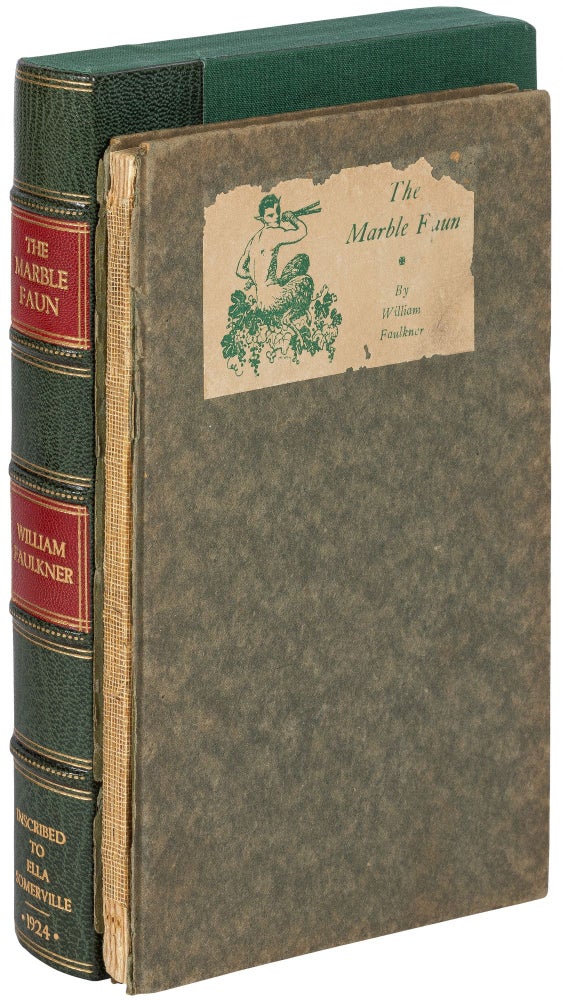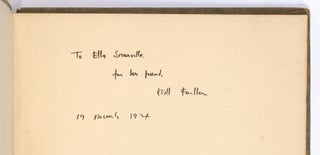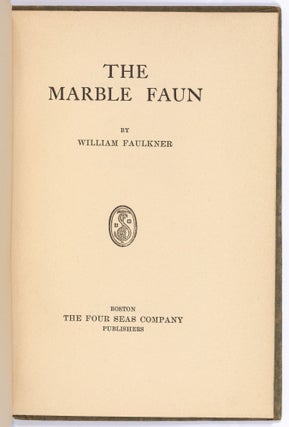Boston: Four Seas Company, (1924).
Sold
Hardcover. First edition. Preface by Phil Stone. Small octavo. Green paper-covered boards with printed label. Cardboard spine lacking as is frequently the case, the printed label is chipped at margins, a sound, good copy of an exceedingly fragile book. In a specially made quarter morocco slipcase.
A presentation copy, inscribed to a college friend: "To Ella Somerville from her friend / Bill Faulkner 19 December 1924."
Ella Somerville had been a student at the University of Mississippi at the same time as Faulkner and she was recruited by her cousin Lucy to join Faulkner's theatrical club, 'The Marionettes." Somerville helped direct performances and developed a strong friendship with Faulkner.
Despite his withdrawal from the University in 1920, the members of the close-knit theatre group would be the earliest readers of first novel, and although Somerville expressed reservations about it, she nonetheless was a great admirer of his work. Somerville and Faulkner remained both friends and fellow Oxford residents throughout the rest of their lives. Somerville was also a good friend and longtime correspondent of Eudora Welty, and she introduced Welty to Faulkner’s writings, first by mailing his books to her, and then to the man himself. The letters between Somerville and Welty often discussed Faulkner's writing, championing his work, and expressing indignation and disgust at anyone who felt differently.
In 1923, publisher Four Seas agreed to publish Faulkner’s collection of poetry *The Marble Faun*, if he would pick up the manufacturing costs (the publisher's standard practice). They offered him a royalty arrangement on each book sold that would have left him financially whole if the book sold out. Faulkner declined, writing: "As I have no money I can not very well guarantee the initial cost of publishing this mss.; besides, on re-reading some of the things, I see that they aren’t particularly significant. And one may obtain no end of poor verse at a dollar and twenty-five cents per volume. So I will ask you to please return the mss. (Letter, November 23, 1923). Six months later, William Faulkner (1897-1962) was able to publish *The Marble Faun* with the encouragement and financial support of Phil Stone, Faulkner’s mentor in Oxford and who would later be the dedicatee of the Snopes trilogy. So buoyed, the twenty-seven year old Faulkner took the plunge and allowed the printing of 500 copies of *The Marble Faun.*
Not surprisingly, the book sold poorly and before long most copies were remaindered; no records survive detailing how many copies of *The Marble Faun* Four Seas managed to sell prior to dumping their remaining stock into the remainder market. Max Salop reportedly offered copies for 19 cents a piece in his Harlem Book Company shop, but it is generally conceded that fewer than 100 copies have survived, although by no means can that many be accounted for.
Even after Faulkner achieved international success as a novelist and prose writer, poetry remained his passion. As late as 1957, seven years after receiving the Nobel Prize for Literature, he could modestly confess to a University of Virginia audience, “I wanted to be a poet, and I think of myself now as a failed poet. Not as a novelist but as a failed poet who had to take what he could do.”
The first edition of Faulkner’s first book, a vanity press publication, and one of the legitimate rarities of American rare book collecting, with a notable association from the fledgling author that connects him to fellow Mississippi author Eudora Welty.
Item #454857




